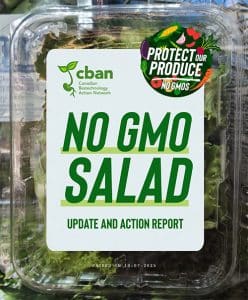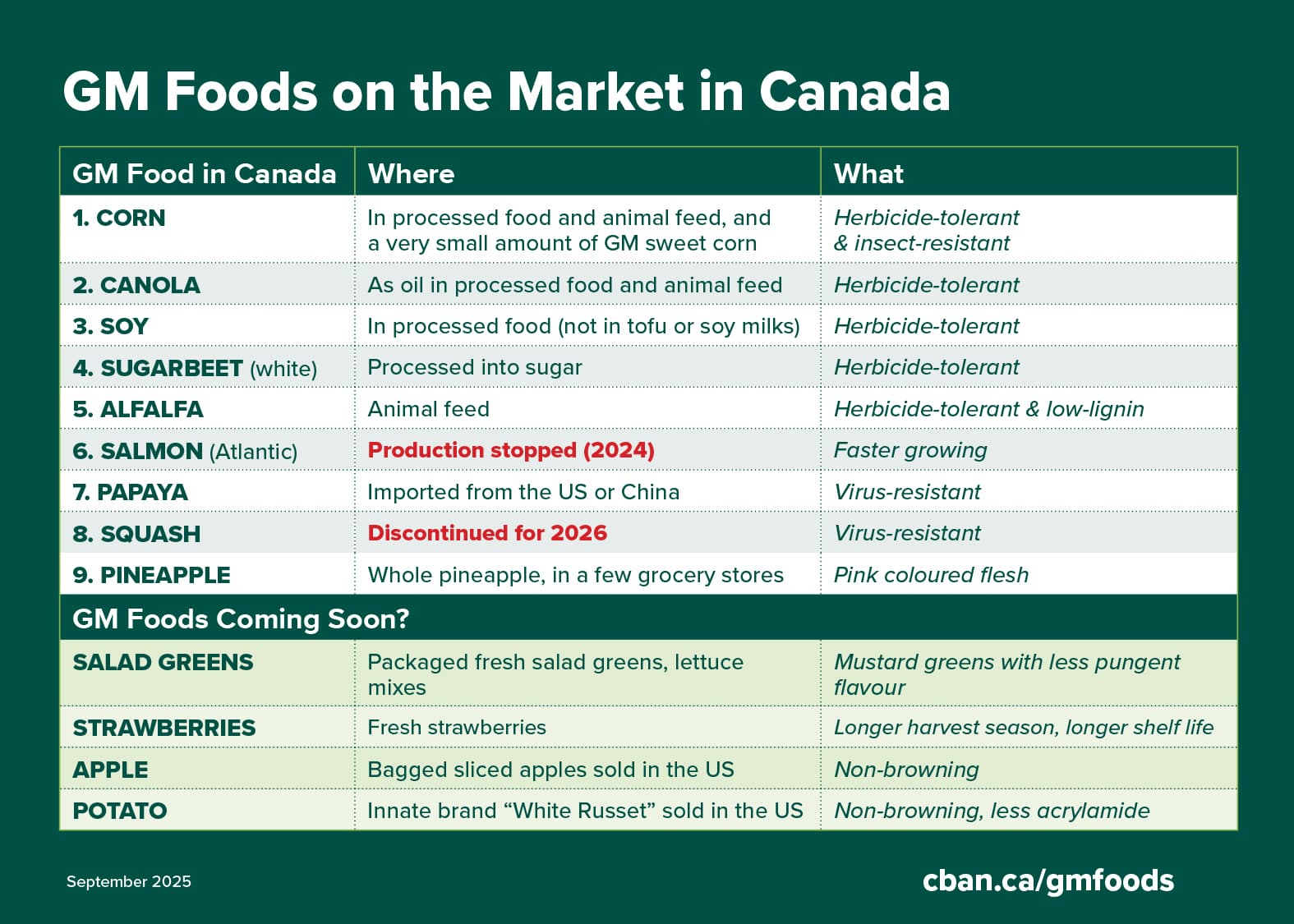No GMO Salad
CBAN Report – October 1, 2025: Gene-Edited Fruits and Vegetables: The Threat of New GMOs in Canada
 July, 10 2025: A new report from CBAN confirms the stalled introduction of Bayer’s genetically engineered (genetically modified or GM) salad greens which would have been the first GM gene-edited food on the market in Canada. Bayer (formerly Monsanto) was preparing to sell GM mustard greens that are gene edited to taste less mustardy. Bayer said it also wanted to sell the GM seeds to home gardeners and market gardeners.
July, 10 2025: A new report from CBAN confirms the stalled introduction of Bayer’s genetically engineered (genetically modified or GM) salad greens which would have been the first GM gene-edited food on the market in Canada. Bayer (formerly Monsanto) was preparing to sell GM mustard greens that are gene edited to taste less mustardy. Bayer said it also wanted to sell the GM seeds to home gardeners and market gardeners.
CBAN’s research has verified that gene-edited greens are not yet in grocery stores in Canada. CBAN found that most major packaged greens brands in Canada have non-GMO commitments. This is in addition to many organic salad options which are non-GMO by definition. However, the market is still open to the entry of unlabelled GM gene-edited salad greens and Bayer continues to promote its gene-edited salad greens on social media. Bayer, and other companies, are working to release gene-edited fruits and vegetables in Canada and the US.
CBAN Report, July 10, 2025: No GMO Salad Update and Action Report
Press Release, July 10, 2025 – New report reveals stalled launch of gene-edited salad greens in Canada
Take Action
Help us stop GM fruits and vegetables.

Write to the head office of your grocery store to ask them not to sell any genetically engineered fruits and vegetables. Click here for your grocery store contacts.
Write to your Member of Parliament to demand mandatory labelling of all genetically engineered foods including gene-edited fruits and vegetables, for trasparency and choice. Click here for some info to support your action.
Subscribe for updates and action alerts: Click here to subscribe for updates and action alerts in the NO GMO SALAD campaign.
Choose non-GMO seeds and support local, ecological and organic seed producers. Learn more and find companies to support here.
If you have information and comments to share, or any questions, please email Fionna Tough at outreach@cban.ca
GM Non-Mustardy Mustard Greens
Bayer (formerly Monsanto) is getting ready to sell genetically engineered (genetically modified or GM) mustard greens that are gene edited to taste less mustardy. These salad greens could be sold in grocery stores in the US and Canada and Bayer also wants to sell the GM seeds to home gardeners and market gardeners. These genetically modified leafy greens were poised to be the first gene-edited vegetable in Canada (produced using CRISPR), and only the second genetically modified vegetable grown in Canada (after GM sweet corn).
In October 2024, Bayer was preparing to launch its GM greens into grocery stores, and GM greens seeds to home and market gardeners, but in May 2025 it backtracked and said it had no target date for release in Canada. However, Bayer continues to promote the GM greens on social media. In May 2025, the company Bayer confirmed to CBAN that its GM gene-edited mustard greens, intended for use in packaged salad mixes, were still not being grown commercially in Canada or the US.
The GM greens will likely be marketed as salad greens that are more nutritious than lettuce: The spicy mustard flavour was removed from the greens so they could be advertised as “leafy greens that don’t bite back! (a mustard green that eats like a lettuce).”
Bayer also says it is seeking a major home garden supplier to sell GM seeds to home gardeners and market gardeners.
CBAN Alert – January 2025: Bayer to Launch GM Non-Mustardy Mustard Greens
Background
Bayer (formerly Monsanto) is licensing the gene editing technology from the US biotechnology company Pairwise.
These genetically modified greens were already briefly sold in 2023 in the United States by Pairwise but were later removed from the market. In May 2023, Pairwise launched these GM greens in the US under their brand “Conscious Greens,” in partnership with foodservice distribution company Performance Food Group’s Peak Fresh Produce® brand. The GM “Conscious Greens” came in two baby-green varieties, marketed in individual 5 oz. bags, called “Purple Power” and “Green Zing.”
Pairwise, the company that developed the GM greens, was founded in 2017 “to lead the way to better health for people and the planet through the power of genome editing.” Pairwise has developed gene editing technology (CRISPR) (their “Fulcrum Platform”) that it is applying to other fruits and vegetables to attempt to develop, for example, pit-less cherries and seedless blackberries.
Some of Pairwise’s initial funding came from Monsanto, and one of Pairwise’s co-founders, Tom Adams, is now the company’s CEO and was formerly the Vice President of Global Biotechnology at Monsanto. Another co-founder, Haven Baker, was formerly the Senior Vice President / General Manager of Simplot, where he led the development of the non-browning GM potato.
Bayer is the largest seed company in the world. When Bayer bought Monsanto in 2018, Monsanto was the world’s largest seed and biotechnology company and Bayer was the world’s second-largest agrochemical company – Bayer now accounts 23% of the commercial seed market and 16% of the agrochemical market. 2024 Report: Bayer’s Toxic Trails: Market power, monopolies, and the global lobbying of an agrochemical giant, from Corporate Observatory Europe.
No Government Safety Assessments
These genetically modified greens will enter the market without any government safety assessments.
These mustard greens were genetically engineered using the gene editing technique of CRISPR. The resulting GMO has no foreign DNA remaining in it. Because there is no remaining DNA from any other species in this GMO, it is exempt from government regulation.
The lack of government regulation means:
- There will be no government safety assessment before the greens are sold for human consumption.
- There will be not government assessment of the environmental risks of releasing these GM seeds.
- These greens will not be listed as approved GMOs on the government’s website.
The federal government of Canada recently removed regulation from many gene-edited foods and seeds, and livestock feed. Health Canada announced (May 18, 2022) that it will allow companies to sell many gene-edited foods without any government safety checks and the Minister of Agriculture and Agri-Food announced (May 3, 2023) that biotech companies can sell some gene-edited seeds without government assessments. Companies can now also sell these genetically engineered seeds, foods, and feed without telling the government about them. These regulatory exemptions apply to products from many gene-edited plants that have no foreign DNA (there is no DNA from other species incorporated). Click here for more information on the government’s decision to remove regulation.
Gene editing is a set of new genetic engineering techniques that can make changes to the genome (DNA) of an organism, without having to permanently incorporate DNA from other species. Click here for more information on gene editing.
Click here to subscribe for updates and action alerts in the NO GMO SALAD campaign.
Risk of GM Contamination in Mustard Variety Brassica juncea
 Bayer’s plan to release genetically modified mustard green seeds and target small growers puts non-GMO plants at risk of contamination, threatening the tradition of seed-saving and the preservation of heritage seeds. GM contamination also threatens organic and conventional farmers’ livelihoods because organics prohibits the use of GMOs, and conventional growers rely on export markets to countries that do not allow GM contamination in their mustard.
Bayer’s plan to release genetically modified mustard green seeds and target small growers puts non-GMO plants at risk of contamination, threatening the tradition of seed-saving and the preservation of heritage seeds. GM contamination also threatens organic and conventional farmers’ livelihoods because organics prohibits the use of GMOs, and conventional growers rely on export markets to countries that do not allow GM contamination in their mustard.
Mustard varieties within the species Brassica juncea can cross with each other and can be self-pollinated or cross-pollinated by insects. The recommended isolation distance, i.e. the distance that two crops of the same species have to be separated so that pollen won’t reach from one to the other, for commercial seed crops of Brassica juncea is 200m (656 feet).
If these GM mustard greens seeds are sold, there is a high likelihood they will contaminate seed stocks and end up, unwanted, in gardens across Canada. This can happen through cross-pollination or through the almost inevitable mixing and escape of the tiny Brassica juncea seed from gardens and fields. There will be few ways to know if this GM contamination has occurred, and it will be difficult or impossible to reverse.
Bayer and other biotechnology companies vigorously enforce patent protection over GM corn, canola and soy seeds but it is unknown how, or if, Bayer will enforce its intellectual property rights over the GM greens.
To read more about contamination and how genetically modified greens could affect organic seed producers, click here for an article written by Bob Wildfong of Seeds of Diversity.







